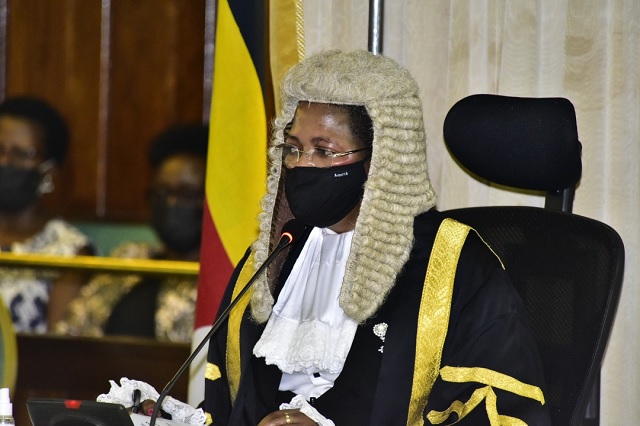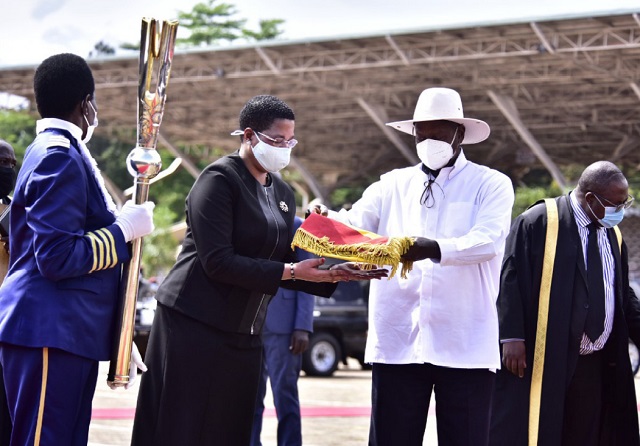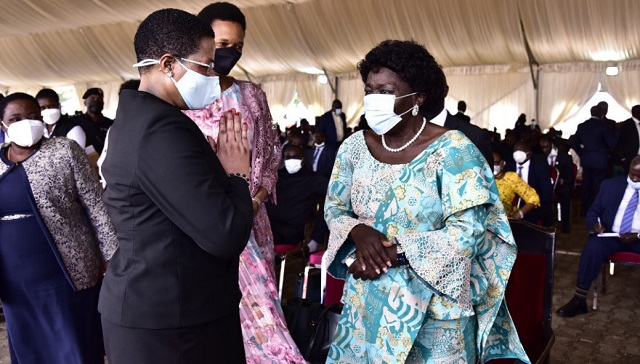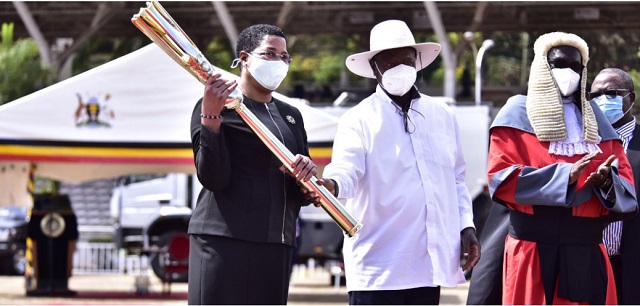
Emerging political powerhouse?
Kampala, Uganda | MUBATSI ASINJA HABATI | As people were questioning the ethical and cultural considerations of electing a new speaker of Parliament when the body of the fallen Speaker Jacob Oulanyah was not yet buried let alone even in the country, Anita Among was consolidating her position as Speaker of the 11th parliament.
The powerful Central Executive Committee (CEC) of the ruling National Resistance Movement (NRM) chose Anita Among, who until the death of Oulanyah has been serving as deputy Speaker, to take up the office of speaker.
“Rt. Hon. Anita Among approved by CEC to be the next speaker of Parliament of Uganda,” an excited Mike Mukula, a member of CEC hailing from the same Teso-subregion as Among, tweeted in the evening of March 23.
The NRM has the majority members of parliament and has special relationship with a great number of independent MPs. Basing on the sheer numbers of NRM legislators, the odds were already in favour of Among.
She garnered 401 votes beating the only competitor Asuman Basalirwa who polled only 66 votes in an election that was held at Kololo Ceremonial Ground on March.25.
A day after Oulanyah’s demise, top leaders in government pointed out Article 82(4) of the Constitution of Uganda which provides that: “No business shall be transacted in Parliament other than election to the office of Speaker at any time that office is vacant.” A number of people including the Acholi parliamentary group and the Archibishop of the Church of Uganda, Rev. Kazimba Mugalu criticized this part of the law.
“As we are mourning the Rt. Hon. Oulanyah, there are campaigns going on to replace him. This is not right,” Archibishop Mugalu told mourners at Oulanyah’s home in Muyenga. He added that the new speaker’s first task is to ensure this part of the law is corrected to tally with the cultural and moral norms of Ugandan society.
Francis Babu, an NRM party politician and former minister in Museveni’s government, agrees with the archbishop. “If there is a nuisance within the law, it should be corrected,” said Babu; adding that: “Every 10 years the constitution should be reviewed but people who are supposed to do this are sleeping on the job.” Babu was responding to the sections of the constitution that conflict with cultural norms. In most African cultures, it is after burying the dead that matters concerning their successor are discussed.

The lacuna in the law
During a vigil at Oulanyah’s Muyenga home on March 23, Chief Justice Owiny-Dollo had said the only thing that Parliament can do is to swear in new Speaker.
“In the case of Hon Jacob Oulanyah, the Parliament has to honour him. He will lie in State in Parliament. Parliament will debate Jacob Oulanyah and those proceedings will be recorded in the Hansards of Parliament and the law says that can only be done when there is a substantive Speaker. It is [Article 82(4) of] the Constitution which we made,” Justice Owiny-Dollo said.
“When there is a vacancy in the Presidency… (which) can be created by death, resignation, or impeachment…the Constitution says the Vice President takes over until an election is conducted.
‘”When there is a vacancy in the office of the Chief Justice, the Deputy Chief Justice takes over until the next Chief Justice is appointed. In Parliament, there is no such provision. Some person was saying they want to rush burying an Acholi and yet [former Bank of Uganda Governor Tumusiime] Mutebile [who died in January], who is a Mukiga, has not been replaced.
“The person could be saying this out of ignorance. They need to be educated on the law. For the benefit of hindsight, we should have treated all the three arms of government the same way. But it is not anti-Oulanyah, it is not being insensitive to Oulanyah. It could have been any one holding that position.”
But a human rights lawyer, Nicholas Opiyo argues that there was need for a wider interpretation of the law.
“Was the Speakers office vacant when Jacob died? I think a wider interpretation of the interpretative clause of the Rules of Procedure suggest it was not since the term Speaker means and include the deputy speaker. The rush to vote was unnecessary,” he said.
Some political commentators say Among was selected by NRM party’s Central Executive Community because she is perceived as a yes-person who will not give the party decisions a hard time to sail through parliament.
But in a statement issued by the NRM party, it stated that Among’s selection as Speaker was based on tradition that deputy speakers have always taken up the seat of the Speaker. They cited precedents like former Vice President Edward Ssekandi who was a deputy speaker of Francis Ayume between 1996 and 2001. Ssekandi was later in 2001 elected as speaker, a position he held until 2011. At the time, the current third Deputy Prime Minister and Minister for East African Community Affairs, Rebecca Kadaga was his deputy speaker. On May.19, 2011 Kadaga became the first female Speaker of Parliament in Uganda’s history, replacing Ssekandi.
Last year in May, Oulanyah replaced Kadaga as speaker after deputizing her for 10 years. Oulanyah was in the position of Speaker for only 9 months and 24 days until he died in Seattle in the United States of America.
The second reason NRM CEC gave was the fact that Among had demonstrated leading parliament in the time Oulanyah was hospitalized. Among had presided over most of the house business meetings. At one time, MPs from Northern Uganda demanded for an explanation why Oulanyah was not chairing parliamentary sessions often. By then, Oulanyah who the media had reported that he was struggling with ill-health, dismissed the MPs’ concerns as unwarranted.
In the queue to become Speaker were 14 NRM legislators. These later dropped to 11 after Minister of Health Ruth Aceng dropped out citing a rushed decision to contest for Speaker without doing “proper consultation”. Among beat 11 other NRM MPs who were vying for the position who included State Minister for Defence, Jacob Oboth Oboth, Deputy Attorney General Jackson Kafuuzi, Dokolo South County MP Felix Okot Ogong, Theodore Ssekikubo, Jackson Atima Lee, Tororo Woman MP Sarah Opendi, State Minister for Sports Hamson Obua, Alex Kintu Brandon (Kagoma North legislator), Florence Asiimwe Akiiki (Masindi district Woman MP), Okot John Amos and Pius Wakabi are the other MPs who wanted the position.

The North-South divide
Meanwhile, as the race for Speaker of parliament to replace the fallen Oulanyah gained momentum, the Acholi Parliamentary group called for postponement of the election arguing that they need time to mourn the fallen Speaker.
But they nominated Minister Hillary Onek as their favourite candidate to replace Oulanyah. However, barely hours after he was nominated by Acholi Parliamentary, he declined the offer claiming he has no legal background, which to him is an advantage for a speaker. They had also nominated MP for Gulu City East Ojara Mapenduzi for Speakership. MP Mapenduzi too turned down the offer.
NRM secretary general Richard Twodong cautioned that the Acholi parliamentary group should remain calm and control emotions. The northern Uganda parliamentary group (from Lango, Acholi, West Nile) had urged NRM to choose a speaker candidate from Northern Uganda.
“If no one from Northern Uganda is chosen by the NRM CEC, we will not set foot in Kololo on Friday to participate in the election of Speaker of parliament,” said MP Kole County.
But NRM CEC ignored those threats and went ahead to nominate Among from Teso sub region in Eastern Uganda. Among who previously was a member of the opposition Forum for Democratic Change (FDC) is now feeling at home in the ruling NRM party. She is an accountant, lawyer and woman member of parliament for Bukedea District.
She previously worked at the Centenary Bank as a branch manager. Before being elected as the deputy speaker she served on the parliamentary of committee on Statutory Bodies and Authority as deputy chairperson in the 10th parliament.
A politically divided parliament?
After serving as deputy speaker for nine months, Among, now assumes the office as speaker. The deputy speaker is now former NRM government Chief Whip Thomas Tayebwa, who had previously wanted that position. Over 11 NRM candidates had offered to contest for deputy speaker but they pulled out in favour of Tayebwa. Tayebwa has been a Member of Parliament representing Ruhinda North county since 2016. He is social scientist and lawyer.
The opposition candidates for both speaker and deputy speaker that has only 100 MPs had no chance against the majority NRM legislators who dominate parliament.
Bugiri Municipality MP, Asuman Basalirwa, who was the opposition candidate for speaker said he was in the race for consistence reasons. “Because of its consistence water weakens the rock,” Basalirwa said poetically referring to the shaking of the NRM tyranny of numbers.
FDC’s Moses Okot Bitek, MP for Kioga West, contested for deputy speaker with a hope to pull the vote of the opposition and disgruntled NRM legislators from the north who wanted their own in the speakership seat “to continue the legacy of the late Oulanyah”. President Yoweri Museveni who chairs the NRM CEC met the MPs from northern Uganda and cautioned them against regional divisive politics.
Prof Murindwa Rutanga, a scholar of politics in the Great Lakes Region based at Makerere University, says Parliament needs a speaker who will unite the country and all MPs. “That speaker should be focused and ready to work with government and the opposition. There is need for a speaker who will heal the cliques that have emerged in parliament,” Rutanga said.

History of Parliament of Uganda’s leadership
First parliament (1962-1963): This body, then known as Legislative Council had 92 members. It was presided over by a British lawyer and former Ugandan Chief Justice Sir John Bowes Griffin.
Second Parliament (1963-1971): It is during this period that the then Prime Minister, Milton Obote, abrogated the constitution and declared himself president in 1966. This parliament also saw the abolition of Uganda’s traditional kingdoms. The Speaker during this period was Narendra M. Patel, a Ugandan of Indian descent.
Third Parliament (1979-1980): This parliament known at the time as Uganda Legislative Council, was established following the overthrow of President Idi Amin in 1979. It started with 30 members before increasing to 120. It was chaired by Prof Edward Rugumayo.
Fourth Parliament (1980-1985): This period marked the return to power of Milton Obote. The Speaker of Parliament at the time was a Harvard trained lawyer, Francis Butagira.
Fifth Parliament (1986-1996): This parliament was established following the end of the gorilla war that started in 1981-1985, with the overthrow of Milton Obote. At the time, it was known as National Resistance Council, with Yoweri Museveni as the speaker, who also concurrently serviced as the Uganda’s president.
Sixth Parliament (1996-2001): This parliament was constituted during the one party rule – National Resistance Movement – with James Wapakhabulo as the speaker, serving two years. From 1998 to 2001, Francis Ayume served as the Speaker.
Seventh Parliament (2001-2006): This parliament was presided over by Edward Ssekandi, the current Vice President.
Eighth Parliament (2006-2011): This parliament was also served with Edward Ssekandi as the Speaker and deputised by Rebecca Kadaga. It had a membership of 326 elected members.
Ninth Parliament (2011-2016): The 9th Parliament was presided over by Rebecca Kadaga and Jacob Oulanyah as the deputy speaker, with a membership of 375 elected members.
Tenth Parliament (2016-2021): The 10th Parliament was also served with Rebecca Kadaga and Jacob Oulanyah as Speaker and Deputy Speaker respectively.
Eleventh Parliament (2021-2026). The 11th Parliament was under the leadership of Jacob Oulanyah as Speaker and Anita Among as the Deputy Speaker.
Eleventh Parliament (2021-2026). Following Oulanyah’s demise, Deputy Speaker Anita Among as elected as Speaker and deputised by former Government Chief Whip Thomas Tayebwa.
****
 The Independent Uganda: You get the Truth we Pay the Price
The Independent Uganda: You get the Truth we Pay the Price




These people were simply jostling for positions. We have had the constitution n the law manuplated for very selfish motives a number of times. So why now when we r in mourning period for our beloved Jacob.
Uganda enyumira.
it is not fair to elect the new speaker when late is not yet buried
Edward Sekandi is not the current vice President….. it’s Jessica Alupo… don’t cheat her limelight